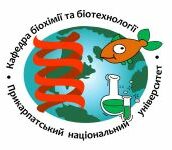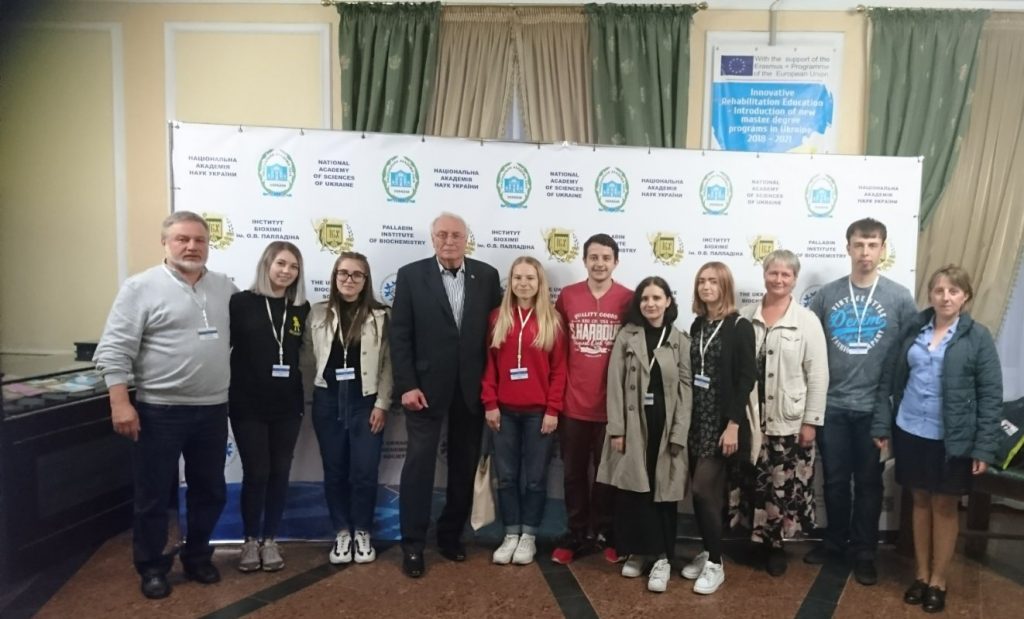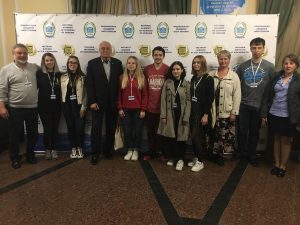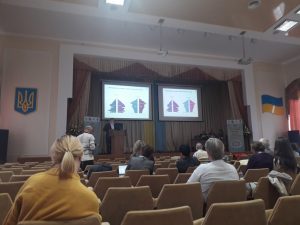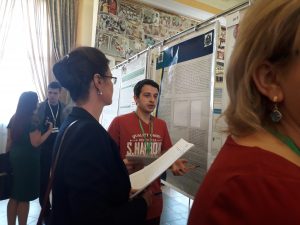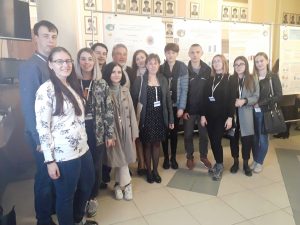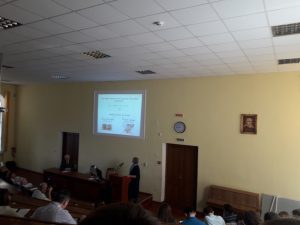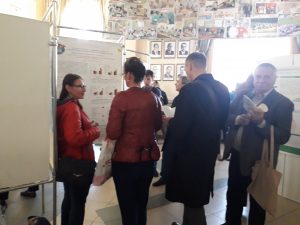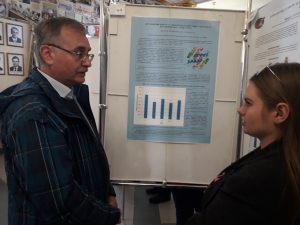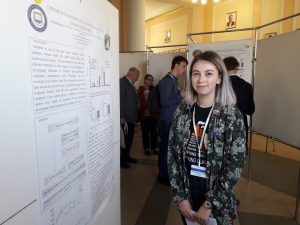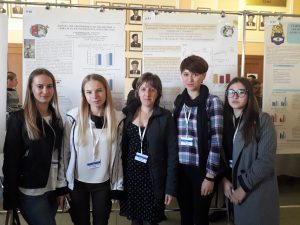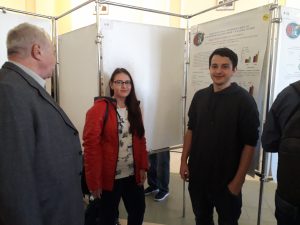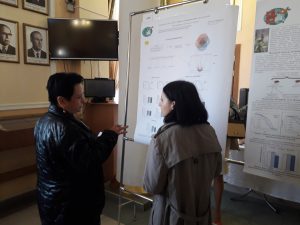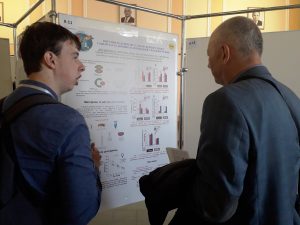XII Ukrainian Biochemical Congress was held from September 30th to October 4th at Ivan Horbachevsky Ternopil National Medical University (Ternonil, Ukraine) and was dedicated to the 165th anniversary of the birth of the famous Ukrainian biochemist, nominee for the Nobel Prize in 1911, Ivan Yakovych Horbachevsky. The event was organized by the National Academy of Sciences of Ukraine (NASU), Ukrainian Biochemical Society, O.V. Palladin Institute of Biochemistry (NASU), and Ternopil National Medical University. More than 250 scientists from different regions of Ukraine (more than 400 registered participants in total) participated in the Congress; about 120 of them were young researchers. Not only biochemists, but also physicians, biotechnologists, physiologists, laboratory diagnosticians, and pharmacologists participated in the Congress, what another time underlines the integrating role of biochemistry in the life sciences. In this context, the first plenary report at the Congress, entitled “Achievements of life sciences – the basis of modern and future medicine” was given by Academician of the NAS of Ukraine, President of the Ukrainian Biochemical Society Serhiy Komisarenko. Along with Ukrainian researchers, many guests from abroad attended the Congress (USA, Croatia, Finland, Czech Republic, Poland). The program of the conference was very intensive and included plenary lectures, parallel symposium sessions and poster sessions.
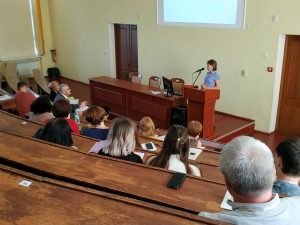
Our university was represented at the congress by a large delegation of the Department of Biochemistry and Biotechnology, consisting of 16 people, 10 of them were students. Head of the Department of Biochemistry and Biotechnology, Prof. Volodymyr Lushchak gave a plenary lecture “Brain aging and its slowdown: The relations
hip between energy supply and reactive oxygen species”, in which he presented the results of a three-year study in the frames of the German-Ukrainian project on the effects of aging and intermittent fasting on energy metabolism and redox processes in aging mouse brain. Symposia oral presentations were given by Prof. Halyna Semchyshyn (“Metabolism of glycation products in a relation with carbonyl/oxidative stress and associated pathologies”) and Dr. Maria Bailyak (“Geroprotective properties of alpha-ketoglutarate regarding fruit fly Drosophila”). All the reports provoked lively and active discussion. Our students and PhD students presented their research at a poster session. During the poster session, there was a competition for the best poster report among young scientists, and we are very pleased that one of the three winners of the competition was our master student Oleh Demianchuk. The winners of the poster session gave short oral reports to present their research findings. Oleh presented research results on the role of Nrf2 and Keap1 regulatory proteins in energy metabolism and antioxidant defense in fruit fly.
In general, all the lectures at the congress were extremely interesting, versatile and informative. In particular, plenary reports covered such issues as regulation of protein biosynthesis at the level of ribosomes (Academician M. Tucalo), the role of calixarenes in cation-dependent myometrial transport systems (Academician S. Kosterin), current knowledge on the mechanisms of diabetes (Corresponding Member of NASU B. Mankovsky), the role of miRNAs in the diagnosis and treatment of cancer (Academician V. Chekhun), implementation of experimental findings into cardiology practice, using example of quercetin preparations (Corresponding Member of NAMSU A. Parkhomenko), the role of coenzyme A in posttranslational modification of proteins and regulation of enzyme activity (Prof. V. Filonenko), metabolic engineering of yeast – effective producers of bioethanol from non-conventional products (Academician A. Sibirny), the use of nanomedicine in the treatment of cancer (Prof. R. Stoyka), development of new biosensors based on nanomaterials (Prof. S. Dzadevich), the role of calcium transport in prostate cancer (Corresponding Member of NASU Ya. Shuba), mechanisms of action and prospects of using diphtheria toxin (prof. D. Kolibo), relationship between circadian rhythms and metabolism (Corresponding Member of NASU O. Minchenko), biomarkers in drug development (Prof. Erka Dumich), the role of the RUK/CIN85 adapter protein in cancer cell reprogramming (Prof. L . Drobot), brain aging and its retardation (Prof. V. Lushchak), role of bacterial adhesins in antibiotic resistance (Prof. V. Zavyalov).
As a part of the Congress, two educational workshops were held. One of them was conducted by Dr. Sandor Wari (USA). On the seminar, it was discussed how innovations affect medicine and why real medicine cannot do without innovation.
The second workshop “Techniques and efficient roadmaps: new options for practicals and innovative learning” was organized by FEBS (Federation of European Biochemical Societies), a member of which is the Ukrainian Biochemical Society. The coordinators of FEBS Workshop were Prof. Tatiana Borisova (Ambassador of FEBS in Ukraine) and Chair of the FEBS Educational Committee Prof. Ferhan Sağın. Lectures and practical trainings for students were performed by Jerka Dumić (Croatia), Keith Elliott (UK), Angel Herráez (Spain), Ferhan Sağın (Turkey) and Beata Vertessy (Hungary). Ukrainian teachers have also shared their achievements and methodological approaches in the field of biochemical education. Our Prof. Volodymyr Lushchak made a report on the peculiarities of biochemists’ training at the Precarpathian National University. In general, the workshop addressed the following working questions: what skills and knowledge are needed for academics, and academics and industry (Jerka Dumić, Keith Elliott), how to write a CV and search for international grants (Keith Elliott), how to choose and prepare for PhD programs abroad (Beata Vertessy) how to properly write scientific articles to make them published in international peer-reviewed scientific journals (Ferhan Sağın), how to teach biochemistry and other life sciences. Regarding teaching, the lecturers talked about the organization and benefits of team-based learning (Ferhan Sağın) and distance/online learning or e-learning (Angel Herráez), various types of biochemistry training – wet, dry and in silico practices, practical labs, theoretical labs, and labs with computer modeling (Jerka Dumić, Keith Elliott). In addition, participants were able to discuss which skills and knowledge are required for modern students, and in groups during section “Meet the expert” to practice team-based learning and e-learning. All discussions were conducted in English. It is worth noting the special activity of our students who were one of the youngest students of the seminar. Upon completion of the course, students received the appropriate FEBS certificates.
Additionally, we would like to mention the positive emotions from the excursions in the laboratories and the Center of Incentive Training of the Medical University. The facilities and laboratories of the Center are kept at very high standards and meet world standards. It should be noted that the rector of the university, Prof. Korda M.M., a biochemist by education, worked abroad for some time, has good expertise in the current challenges in education and science, so experimental research and practical training of physicians at the university are provided with special support.
In general, participation in the congress was very informative and productive for our scientists. They came back with new knowledge, ideas and acquaintances and a large luggage of positive energy.
